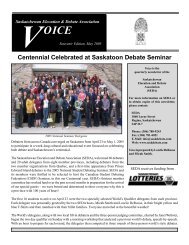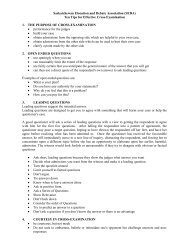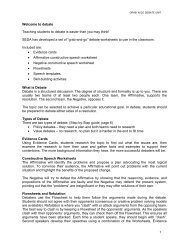Human Cloning - Saskatchewan Elocution and Debate Association
Human Cloning - Saskatchewan Elocution and Debate Association
Human Cloning - Saskatchewan Elocution and Debate Association
Create successful ePaper yourself
Turn your PDF publications into a flip-book with our unique Google optimized e-Paper software.
Seeing Double: The <strong>Cloning</strong> Conundrum Page 2 of 8<br />
Canadian Speeches, November-December 2002<br />
for 12 days before they halted the<br />
experiment for ethical reasons.<br />
This outraged many people. The<br />
United States, Canada, <strong>and</strong> many<br />
other countries began seriously<br />
considering laws to ban human<br />
cloning. In the year 2000, only<br />
10% of polled Canadians were in<br />
favor of cloning.<br />
Despite little public support,<br />
some businesses are racing to<br />
clone the first human. Perhaps the<br />
most implausible is Clonaid, a<br />
company formed by the Reaelian<br />
Movement, a spiritual group<br />
which believes that human life<br />
originated with visitors from<br />
outerspace. In 2000, Clonaid,<br />
claiming to be the first human<br />
cloning company, reported that it<br />
was going to clone a deceased 10month-old<br />
child. It claims to have<br />
been contacted by many other<br />
parents who have lost children.<br />
Clonaid said it would produce the<br />
first cloned baby born in 2001,<br />
but no evidence that this goal was<br />
attained.<br />
ACT has had more luck. In<br />
January of 2001, its researchers<br />
succeeded in combining an adult<br />
human cell with a human egg <strong>and</strong><br />
saw it begin to divide, but<br />
inexplicably stopped at the sixcell<br />
stage.<br />
In May 2002, Hans Schoeler of<br />
the University of Pennsylvania's<br />
veterinary school, announced that<br />
he had discovered a single<br />
misbehaving gene that could<br />
explain most failures to clone<br />
mammals. The Oct4 gene is<br />
crucial for early development <strong>and</strong><br />
is usually not reprogrammed<br />
properly when cloned. Schoeler<br />
claims that 90% of all cloned<br />
embryos that fail to develop are<br />
caused by this gene. No solution<br />
has been discovered to reprogram<br />
the gene properly.<br />
As of July 2002, China is<br />
reported to have cloned more than<br />
30 human embryos for medical<br />
research; an Italian doctor<br />
Severino Antinori claims the<br />
world's first human created by<br />
cloning will be born in<br />
December, but will not reveal the<br />
identity of the parents; <strong>and</strong> the<br />
South Korean government is<br />
investigating a claim that Clonaid<br />
has implanted a cloned embryo in<br />
a Korean woman, who is almost<br />
three months pregnant.<br />
While these claims are not yet<br />
validated, we might before 2004<br />
have in our midst the first cloned<br />
human baby. The next few years<br />
will be defining moments in<br />
human history, as a great<br />
revolution in the way people view<br />
human life <strong>and</strong> cloning rolls on.<br />
LAYING DOWN THE LAW<br />
• In Canada. There are no laws<br />
passed prohibiting or<br />
regulating human cloning in<br />
Canada. The federal<br />
government has introduced a<br />
bill called the Assisted<br />
<strong>Human</strong> Reproduction Act<br />
(AHRA).<br />
The bill has two fundamental<br />
goals. Firstly, for people to<br />
have children safely <strong>and</strong><br />
ethically, <strong>and</strong> secondly, to<br />
ensure research into<br />
reproductive technologies is<br />
done in a morally acceptable<br />
manner.<br />
The bill calls for a ban on<br />
human cloning to preserve<br />
<strong>and</strong> protect human<br />
individuality <strong>and</strong> health risks.<br />
It prohibits the cloning of<br />
stem cells, but advocates<br />
using human embryos <strong>and</strong><br />
stem cells in research which<br />
are left over from assisted<br />
reproduction attempts. The<br />
bill denounces the buying<br />
<strong>and</strong> selling of human<br />
embryos.<br />
If the bill passes, parents will<br />
not be able to select the<br />
gender of their child or make<br />
changes to human DNA that<br />
would pass from one<br />
generation to the next.<br />
• In the United States.<br />
President Bush made a<br />
speech on April 10, 2002,<br />
condemned therapeutic <strong>and</strong><br />
reproductive cloning, stating<br />
that, "Life is a creation, not a<br />
commodity." He said he<br />
would allow federally-funded<br />
research to proceed only on<br />
the very limited number of<br />
existing stem cells.<br />
There is still no legislation to<br />
ban cloning, but Senator Sam<br />
Brownback, a Republican<br />
from Kansas, has proposed a<br />
permanent ban <strong>and</strong> criminal<br />
penalties for any scientist or<br />
company that violates it. The<br />
bill is entitled the "<strong>Human</strong><br />
<strong>Cloning</strong> Prohibition Act of<br />
2001."<br />
As a result of the lack of<br />
federal funding, much of the<br />
therapeutic cloning research<br />
that would have been<br />
conducted in the United<br />
States might now be<br />
conducted in other countries.<br />
• United Nations <strong>and</strong> the<br />
World. The Universal<br />
Declaration on the <strong>Human</strong><br />
Genome <strong>and</strong> <strong>Human</strong> Rights,<br />
adopted by the UN's General<br />
Conference in 1997 <strong>and</strong><br />
endorsed in 1998, banned<br />
reproductive human cloning.<br />
France <strong>and</strong> Germany<br />
proposed a resolution asking<br />
the General Assembly to<br />
create a special committee to<br />
draft a legally binding<br />
international convention





